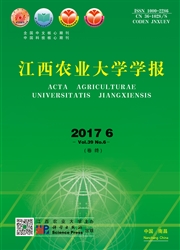

 中文摘要:
中文摘要:
以春光1号水稻为供试种子,链霉菌JD211为供试菌,通过浅盘试验研究链霉菌JD211对水稻生物量和土壤细菌多样性的影响。结果表明:菌剂用量10gkg一对水稻幼苗的生长有极显著的促进作用,幼苗总干重、地上部分干重、地下部分干重与对照相比分别提高52.15%、44.56%、65.55%,植株全氮、全磷分别提高90.10%、58.51%。与CK土壤相比,菌剂用量10gkg。的土壤速效氮、有效磷均有显著提高,分别提高了37.49%、40.62%。细菌多样性的末端限制性片段长度多样性(T—RFLP)分析表明链霉菌JD211能促进一些稀有或生态势较弱的细菌生长,使参与土壤营养循环、改善土壤质地及防治植物病害的功能菌成为优势菌群。土壤功能微生物类群的变化,加速了N、P等土壤养分循环,增强了水稻对N、P等矿质养分的吸收,从而促进水稻生长。
 英文摘要:
英文摘要:
To explore influence of soil microbes and their metabolites on crop growth, a platter cultivation experiment was carried out using Rice Spring No.1 to test Streptomyces JD211 for effect of the strain of bacteria on biomass of the seedlings and diversity of soil bacteria. Results show that the effect of the bacterial agent, 10 g kg-1 in inoculation rate was extremely significant on rice seedlings, which were 52.15%, 44.56% and 65.56% higher than the seedlings in total dry weight, shoot dry weight, and root dry weight, respectively, and 90.10% and 58.51% higher in total nitrogen and total phosphorus, respectively. Compared with the soil in CK, the inoculated soil was 37.49% and 40.62% higher in available nitrogen and phosphorus. T-RFLP analysis of bacterial diversity shows that Streptomyces JD211 promoted the growth of some rare species of bacteria or species weak in ecological potential, thus turning some functional bacteria, which were involved in recycling of soil nutrients, ameliorating soil texture and controlling plant disease, into dominant ones. The changes in soil functional microflora accelerated recycling of soil N, P, etc. and enhance rice absorption of N, P and other mineral nutrients, thereby promoting growth of the rice.
 同期刊论文项目
同期刊论文项目
 同项目期刊论文
同项目期刊论文
 期刊信息
期刊信息
